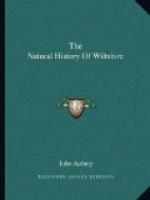At Crokerton, near Warminster, hath been since the
restauration (about
1665) a manufacture of felt making, as good, I thinke,
as those of
Colbec in France. Crokerton hath its denomination
from the crokery
trade there; sc. making of earthen — ware, &c.
Crock is the old
English word for a pott.
___________________________________
It ought never to be forgott what our ingenious countreyman Sir Christopher Wren proposed to the silke stocking weavers of London, Anno Domini 16-, viz. a way to weave seven paire or nine paire of stockings at once (it must be an odd number). He demanded four hundred pounds for his invention; but the weavers refused it because they were poor; and besides, they sayd it would spoile their trade. Perhaps they did not consider the proverb, that “light gaines, with quick returnes, make heavy purses.” Sir Christopher was so noble, seeing they would not adventure so much money, he breakes the modell of the engine all to pieces before their faces.
[This chapter contains many other remarks on trades, inventions, machinery, &c. similar in character to the above.- J. B.]
PART II — CHAPTER VI.
Architecture.
[In this chapter, the account of Aubrey’s visit to Old Sarum, and the traditions connected with the erection of Salisbury Cathedral, although they furnish no new facts of importance, will be read with interest; especially on account of the reference they bear to the enlightened and munificent Bishop Ward. A memoir of that prelate was published by Dr. Walter Pope, in 1697 (8vo); and some further particulars of him, as connected with Salisbury, will be found in Hatcher’s valuable History of that City. — J. B.]
The celebrated antiquity of Stonehenge, as also
that stupendious but unheeded antiquity at Aubury,
&c. I affirme to have been temples, and built
by the Britons. See my Templa Druidum. [The essay
referred to was a part of Aubrey’s Monumenta
Britannica, the manuscript of which has strangely
disappeared within the last twenty yeares. I have
given an account of its contents in the Memoir of
Aubrey, already frequently referred to,(page 87).
Aubrey was the first who asserted that Avebury and
Stonehenge were temples of the Britons. He was
also the first person who wrote any thing about the
forms, styles, and varieties of windows, arches, &c.
in Church Architecture, and his remarks and opinions
on both subjects were judicious, curious, and original.
- J. B.]
___________________________________
Here being so much good stone in this countrey, no doubt but that the Romans had here, as well as in other parts, good buildings. But time hath left us no vestigia of their architecture unlesse that little that remains of the castle of Old Sarum, where the mortar is as hard as a stone. This must have been a most august structure, for it is situated upon a hill. When the high walles were standing, flanked at due distances with towers, about seven in all, and the vast keep (arx) in the middle crowned with another high fortification, it must needs afford a most noble view over the plaines.




